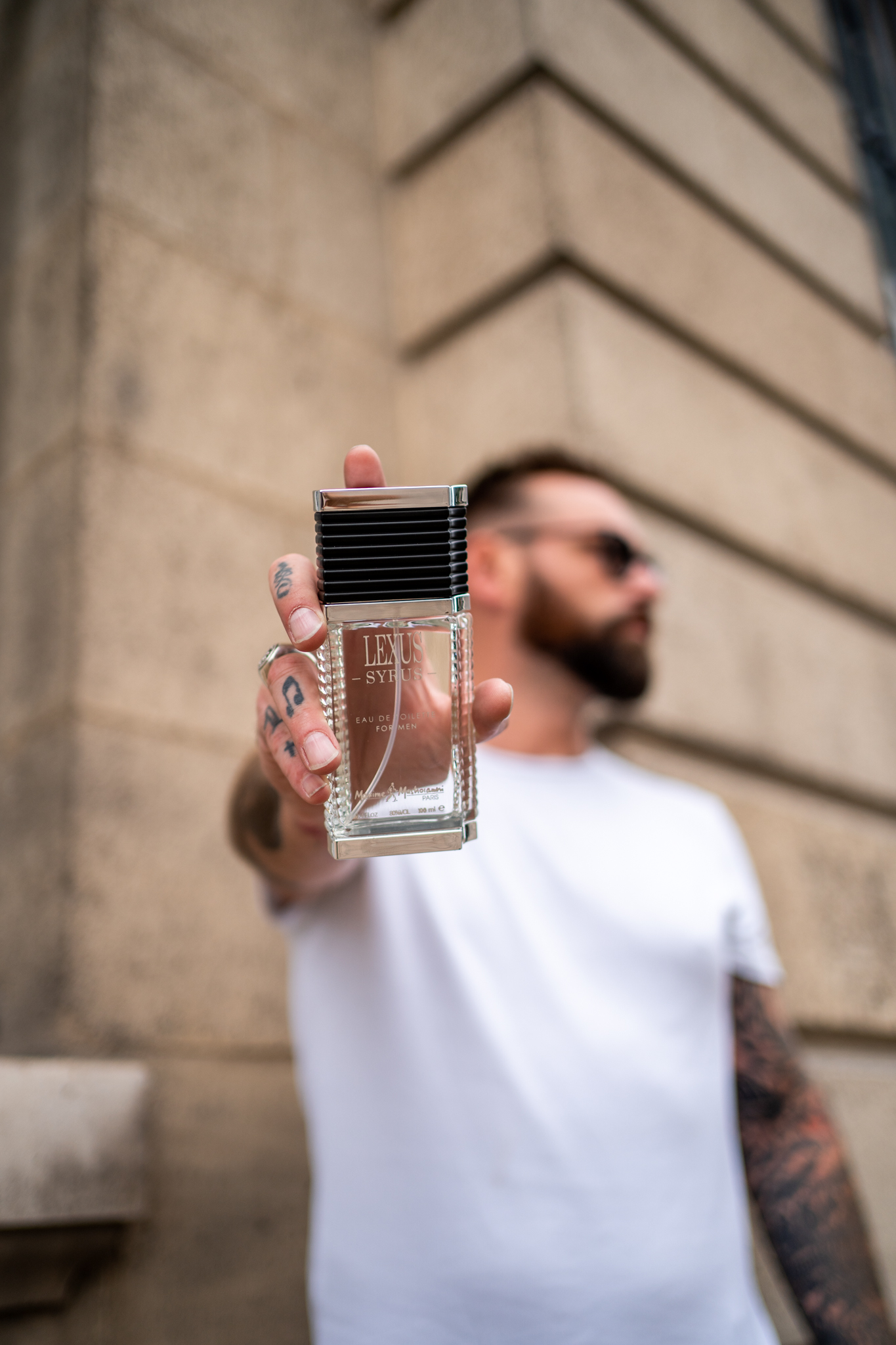The impact of fragrance on our mood
A sensory immersion: discovering perfume

Fragrance is a key element in our sensory life. More than a simple scent, its power lies in its ability to create intimate links between the wearer and his or her environment. In an almost magical way, a fragrance has the power to take us on a journey through time and space, awakening buried memories and invoking powerful emotions.
In a psychological context, fragrances have a major impact on our mood. Studies show that certain scents can induce specific moods. Lavender, for example, is renowned for its soothing effects, while peppermint can have a refreshing, invigorating effect. So, choosing the right fragrance can be a real weapon for controlling our emotions and boosting our morale.
Perfume also represents a distinct form of personal expression. It highlights our personality, reveals our innermost desires and serves as a tool of seduction. Each person is a unique bouquet of scents, made up of their origins, tastes and experiences. Choosing the right fragrance is therefore a decision that involves deep reflection and introspection.
Often underestimated, the impact of olfaction on our well-being is real. Studies show that people who enjoy their fragrance feel more confident and attractive, which significantly improves their quality of life. What's more, certain fragrances can aid relaxation, promote good sleep and even reduce stress.
So the world of fragrance is a true sensory immersion, an experience that directly touches our subconscious. Fragrances are not just scents, they are also revelations of our identity, instigators of our emotions, vectors of our well-being. They are a powerful form of non-verbal communication, creating around us an atmosphere of mystery, elegance and sensuality.
The fragrance experience is therefore vital to our psychological equilibrium. Every note, every chord, every fragrance has the power to bring happiness, tranquility and well-being into our lives. So let's let ourselves be carried away by the immersive experience of discovering a new fragrance.
The unsuspected link between fragrance and psychology

Aromachology, a relatively recent branch of science, aims to study the impact of odors on human behavior. It is a remarkable fusion of aromatherapy and psychology. The practice, though seemingly new, dates back thousands of years.
Our ancestors often used perfumes to celebrate the gods, promote healing or enhance their sexual appeal. Today, the perfume industry builds on these ancient practices, while incorporating more modern research into the influence of fragrance on our moods to create scents that do more than simply smell good.
Our perception of scents has been shown to be linked to our emotions and, by extension, to our behavior. Scents have the power to awaken memories, trigger emotions and can even have a therapeutic effect. For example, some studies indicate that the scent of jasmine can relieve anxiety and promote quality sleep, while Collection-parfums-femmes.pngl the smell of lemon is said to have an invigorating effect and boost our mood.
Despite the fact that aromachology is a relatively recent science, requests for fragrances specifically formulated to enhance well-being are on the rise. Fragrance manufacturers have caught on to this trend, and now offer a variety of scents designed to elevate mood, aid concentration, relieve stress and promote restful sleep. This gives us a sense of control over our emotions.
Understanding the link between fragrance and psychology can play a major role in our emotional well-being. Whether to enhance concentration, improve mood or simply enjoy a pleasant fragrance, the selective use of fragrances can certainly contribute to our overall well-being.
In short, the role of fragrance in our lives goes far beyond the purely olfactory. The incredible ability of scents to trigger emotions and influence our moods is a valuable tool that can be used to significantly improve our lives. Taming this power through a better understanding of the science of aromachology could be the key to unlocking a higher level of emotional well-being.
The effect of fragrances on our mood: a scientific exploration

Fragrances have a natural affinity for our limbic system, the area of the brain that controls emotions and memories. Fragrance molecules enter the nose where they stimulate the olfactory nerve, sending signals directly to the limbic system. We can clearly see that our psychology is directly influenced. This is precisely why certain scents can provoke feelings of contentment or joy, and even evoke specific memories. For example, the scent of lavender has long been associated with relaxation and calm, largely because it stimulates the alpha brainwave activity associated with relaxation.
The emotional reactions generated by fragrances are diverse and depend on a number of factors. Some scents can act as stimulants, increasing our energy and concentration, while others are more soothing, promoting relaxation and well-being. Citrus fruits such as lemon or bergamot are often used in stimulating fragrances, as they can help increase attention and alertness. On the other hand, fragrances based on sandalwood or chamomile are generally more relaxing, as they help reduce anxiety and promote peaceful sleep.
The connection between fragrance and mood doesn't stop there. The effectiveness of a fragrance on our mood can also be influenced by our own personal experiences and associations with that scent. For example, if a person associates the smell of roses with a happy experience, they are likely to feel happier when they smell that scent in the future. This is known as the "conditioned learning response" in psychology, and is a key element in how fragrances affect our mood.
All in all, the effect of fragrances on our mood is a fascinating area of science, combining elements of chemistry, neurology and psychology. It demonstrates how our senses - in particular our sense of smell - are intimately linked to our emotions and overall well-being. And although the science is complex, the conclusions are simple: fragrances have the power to make us feel better, happier and more at peace - a fact that each and every one of us can experience every day.
How perfume can contribute to our daily well-being
There's a powerful, often overlooked, link between fragrance and well-being. Fragrances have the power to awaken a variety of emotions and states of mind, enriching our daily well-being. The link between certain fragrances and their psychological and emotional effects has been well documented in numerous scientific studies. More specifically, olfaction, or the sense of smell, is closely linked to the part of the brain that processes emotions and memories. Fragrances can therefore provoke strong, instantaneous emotional reactions in people.
The contribution of fragrances to improving mood and self-esteem is profound. Fragrances can significantly influence our moods; a favorite fragrance can lift our spirits, and a scent we associate with fond memories can instantly make us feel happier and better about ourselves. What's more, fragrances allow us to express our identity and individuality. By choosing a fragrance, we show the world who we are, boosting our self-esteem and self-confidence.
The role of fragrance in mental health is also significant. Aromatherapy, an ancient practice that uses essential oils extracted from plants to promote health and well-being, has shown that certain scents can help reduce stress and anxiety. Other studies highlight the potential of fragrances to help combat insomnia and improve sleep quality. Fragrances do much more than simply smell good; they can actually help us feel better, calmer and more relaxed.
It's also crucial to mention the impact of fragrance on our physical health. A growing body of research shows that certain fragrances can have beneficial effects on our bodies. For example, certain scents can influence the nervous system to lower blood pressure and heart rate, encourage relaxation and even relieve pain. So, as well as elevating our mood and emotion, fragrances can play a vital role in improving our physical well-being.
So fragrances are more than just a pleasant scent. They have a real capacity to influence our psychology and improve our daily well-being.
The use of fragrance in the cosmetics and fashion industry
The vitality of fragrance in the beauty industry cannot be underestimated. Fragrances are seen as an extension of personality, an olfactory expression of individual character. They have a profound impact on our mood and state of mind, tangibly influencing our behavior and perception. Perfume is also held in high esteem for its supposed benefits for mental well-being. Thus, the choice of fragrance can be seen as a self-care ritual, a practice that boosts self-confidence and enhances emotional well-being.
By deploying seductive and bewitching aromas, the cosmetics industry uses the power of fragrance to evoke certain emotions and influence consumer choice. Many cosmetics brands have integrated distinctive fragrances into their products, from skincare to make-up, enhancing the overall user experience. The use of specific ingredients and fragrance blends also contributes to the creation of a unique brand identity, enhancing brand recognition and consumer appeal.
The relationship between fragrance and fashion is also closely linked. A fragrance can represent the essence of a fashion brand, visually translating its image and style into an olfactory experience. Many luxury fashion houses have created their own fragrances, which often complement their clothing collections. Fragrance launches are celebrated with as much enthusiasm as fashion shows, demonstrating the influence of the two industries on each other.
As well as serving as a fashion accessory, perfume plays an important role in the psychology of fashion. A well-chosen fragrance can not only complement an outfit, but also reinforce a particular mood or evoke specific emotions. It can make a person more attractive and boost self-confidence. So, like fashion, fragrance is a powerful tool of self-expression that can enhance our overall emotional well-being.
Beyond their use in the cosmetics and fashion industry, fragrances also have therapeutic potential. Scientifically proven, the effect of fragrances on our moods could be used as a non-invasive method of relieving stress, anxiety and depression. As such, they could become an integral part of mental health care in the future.
Exploring the full range of fragrance effects: much more than just an aroma

When it comes to appreciating fragrances, our first thought is often linked to how pleasant they smell. However, a growing body of research suggests that the influence of fragrance goes far beyond this. These complex fragrances appear to have a significant impact on our moods and emotions, even influencing our sense of well-being.
Let's look first at the therapeutic uses of fragrances. In the field of aromatherapy, for example, the use of fragrances is exploited to provide both psychological and physical benefits. Studies have shown that certain scents can actually relieve pain. Lavender, for example, has been used to soothe headaches, while eucalyptus is often recommended to relieve congestion. In addition, studies have reported that specific fragrances can also improve sleep quality, reduce anxiety or boost energy and positive mood.
Perfume also plays a major social role. It serves as a means of expressing individual identity, influencing how we are perceived by others and how we perceive ourselves. A fragrance that pleases us personally can give us a sense of self-confidence, while a fragrance appreciated by others can improve our social relationships. What's more, some studies suggest that fragrances may even increase physical attraction, strengthen emotional bonds and improve non-verbal communication.
Clearly, the impact of fragrances is not limited to our sense of smell. They have the power to evoke memories, change our moods and influence our behavior. The world of fragrance is a complex exploration of chemistry and psychology, fusing science and art in a field that continues to fascinate and intrigue. Fragrance, then, is much more than a simple combination of fragrant ingredients; it is a powerful tool that can affect our physical, emotional and social well-being.
There's no doubt that more research is needed to fully understand the far-reaching effects of fragrance. Nevertheless, it's undeniable that fragrances occupy a far more important place in our lives than we might think, and in many inspiring and surprising ways. Beyond mere olfactory pleasure, the world of fragrance still has much to offer us in terms of well-being and understanding our own psychology.
Perfume by Carole Daver: the synthesis of elegance and accessibility
Founded at the end of the last century, Carole Daver has risen to the top of the perfume industry by embodying the excellence of French quality. Under the creative vision of Antoine Hervé Madrid, the brand has fused tradition and modernity to create iconic fragrances that transcend generations. Each fragrance is an invitation to plunge into a vibrant, colorful universe, where olfactory stories tell unique tales.
Final thoughts: The undeniable role of perfume in our daily lives

Perfume is much more than a beauty accessory; it's an integral part of our daily lives, significantly influencing our moods and emotions. Every fragrance we wear leaves an emotional imprint, written in an incomparable universal language.
The role of fragrance in our daily lives transcends cultural and social barriers, reaching the heart of our individual preferences and emotions. It has the ability to act on our state of mind, stimulating or soothing our mood through its notes and composition. It can transport us to distant places and trigger long-forgotten memories. It makes the intangible tangible, crystallizing our desires, fears and dreams in a delicately complex fragrance.
More than an olfactory impression, fragrance is a way of communicating our individuality and personality to the world around us. It says what words cannot, offering an intimate and personal understanding of our emotional depths. It speaks of intimacy and sensuality, passion and seduction, expressing an essential part of our being.
In terms of well-being, fragrance plays a major role. Several studies show that certain scents can stimulate the production of certain hormones in the body, with beneficial effects on our general well-being. For example, citrus fruits are known to boost serotonin, a hormone that regulates our mood, sleep and appetite. Fragrance therefore has a real impact on our health, both mental and physical.
The psychology of fragrance is a rapidly expanding field. More and more researchers are dedicating their work to understanding the complex relationship between fragrance and emotion. The results of these studies are fascinating: not only do they confirm the influence of fragrance on our moods, they also pave the way for innovative therapeutic approaches in which fragrance could be used to improve our well-being and quality of life.
In conclusion, fragrance is an integral part of the fabric of our existence. It shapes our daily lives and informs our emotions. It is constantly evolving, reflecting our identity and our personal journey. Each of us carries a story in a bottle, a story of feelings, discoveries and emotions, told through the unique alchemy of fragrance.

